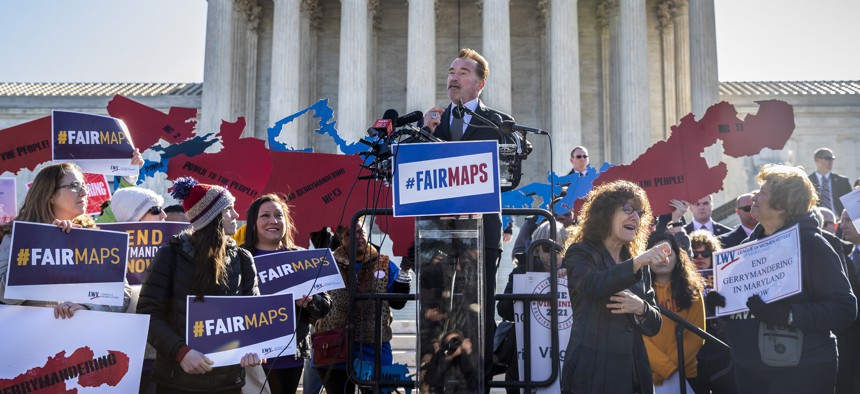In These States, (Almost) Anyone But Lawmakers Can Do Redistricting

Former California Gov. Arnold Schwarzenegger speaks at a rally calling for "Fair Maps" at the Supreme Court in March 2019. Schwarzenegger has been an outspoken supporter of citizen redistricting since California started the reforming the process in 2008. Carolyn Kaster/AP Images
Connecting state and local government leaders
California pioneered the practice of creating an independent commission to draw new district maps. Every ten years, anyone in the state can apply for the job, except legislators and those who work with them.
Redistricting, the method by which federal and state legislative districts are updated, looks different in every state. Some use the same process for drawing state legislative districts as they do for congressional districts, while others separate the two. Some states have instituted public participation requirements, racial equity stipulations, and bans on favoring incumbents. Some require the legislature to approve the final maps with a supermajority, and some give governors the power to veto them.
But perhaps the most significant difference in the redistricting process from state to state lies in who actually draws the maps. In most states, the legislature draws one or both of the maps for congressional and state legislative districts. A few use political commissions appointed either by the governor or the legislature. Only four states—California, Michigan, Colorado, and Arizona—use independent commissions to draw their maps.
In 2008, California became the first state to establish a citizen-led independent redistricting commission when the state passed Proposition 11, the Voters First Act, which took the process out of the hands of the legislature. Kathay Feng, the national redistricting director for Common Cause and the architect of California’s Citizens Redistricting Commission, said allowing elected officials to set maps is a recipe for gerrymandering.
“It’s fundamentally human nature to want to draw a safe district for yourself and your party,” Feng said. “Since we pushed for reform via ballot initiative instead of negotiating with legislators, we went for the ideal arrangement: massive public involvement and removal of the legislature from the direct selection of commissioners or the drawing of lines.”
Gerrymandering and Grandstanding
California had a history of questionable political maps leading up to the creation of the independent redistricting commissions. In 2001, Republican and Democratic lawmakers conspired to create maps that would protect incumbents, and as a result, the next seven years saw only four seats change parties out of 495 California races. The maps were so bad that former Gov. Arnold Schwarzenegger has since become an outspoken advocate for redistricting reform. (After a 2017 Supreme Court ruling about Wisconsin’s maps, he revived his famous Terminator line to remark it’s “time to say, ‘Hasta la vista’ to gerrymandering.”)
Feng said the results of 2001’s redistricting effort caused reform efforts to ramp up in the state. “We learned that the process was set up to look like community participation was welcome, but really it was incumbents going behind closed doors to draw the lines they needed for their own political preservation,” she said. “The game was clearly rigged.”
Before the ballot initiative, coalitions tried to work with the legislature, proposing small changes, such as requiring maps to be made public before a final vote. Several measures were introduced, but the bill that got the furthest, proposed in 2006 by then-state senator and now U.S. Rep. Alan Lowenthal (D), died when, as Feng described, “the bill was literally lost, and there was an argument over whether the Senate didn’t walk it over to the Assembly clerk, or the Assembly clerk didn’t process it.”
“Quite honestly, that’s the story of most redistricting reform when it goes through the legislature,” Feng said. “There’s a lot of grandstanding and then it mysteriously disappears.”
Advocates for reform then turned their focus from how district lines were drawn to who should draw them. They took up the ballot initiative with a “happy band of unusual allies and an unsurprising group of opponents,” Feng said.
Proposition 11 passed in 2008 with only 50.82% of the vote, and was opposed by many prominent California politicians, including Rep. Nancy Pelosi (D) and former Sen. Barbara Boxer (D).
The new law stipulated that an independent, 14-member redistricting commission be selected from a broad group of Californians. The group didn’t need to be perfectly representative across geographic, racial and ethnic, or occupational backgrounds, but it was required to be close. That made the recruitment process a challenge.
Open Application Season
In December 2009, the commission opened for applications for the first time, and 600 people applied the first day. Most of them were well-educated, and they tended to be white and male property owners who lived in and around Sacramento. But after a series of radio ads, in-person recruitment at community organizations, and public education efforts in libraries and colleges, the final group of 30,000 applicants were more representative of the state’s population.
The same process played out this year, when applications opened for the second round of redistricting to be done by the independent commission. About 21,000 people applied this summer—with a majority again being white and male.
Every applicant is asked to submit college essay-style explanations for why they want to be on the commission, provide several references, and explain why they can be impartial. Applicants must have voted in at least two out of the last three statewide elections and must have been registered with a political party or as an independent for the past four years.
That process brings the applicant count to the low thousands, explained Margarita Fernandez, the chief of public affairs with the California State Auditor, who runs the process. “We get to learn about applicants’ analytical skills and their appreciation for California’s diversity,” she said. “But we also start weeding out potential conflicts of interest.”
Those could include working for the state legislature in the past ten years, donating more than $2,500 to a political candidate in one year, or being a registered lobbyist, consultant, or political appointee. Once a panel of three independent auditors reviews all eligible applications, they can select up to 120 applicants to interview, then submit 60 candidates (20 Democrats, 20 Republicans, and 20 with no affiliation) to state legislative leaders. Those officials can strike up to 24 applicants from consideration.
With the final 36 contenders, the state auditor uses a wire bingo cage to select eight numbered balls representing the first commissioners (three Republicans, three Democrats, and two with no affiliation), who then read the remaining applications and work together to choose the next six. Though the strategy might seem oddly low-tech, Feng said that’s precisely the point. “You can see exactly what’s going on,” she said. “There’s no sense that anything is hidden or rigged or weighted.”

Drawing the Maps
The commissioners have a year to draw new maps, using whatever process they want. In 2009, commissioners traveled the state hosting about 100 public hearings and taking testimony from around 20,000 residents. At these meetings, maps were live on screens in front of the room, and as people testified, they would move lines by a few blocks to see the potential impact of any change—a real-time response mechanism Feng said drove engagement in the process. She described the atmosphere at a hearing in Culver City as “tantamount to the level of excitement over new iPhone releases—people were actually camped out in line hours before it started.”
Final maps must be approved by a commission supermajority. They have been challenged in court three times, but upheld unanimously by judges appointed by both Democratic and Republican governors.
Fernandez described the first redistricting commissioners as “pioneers without a road map.” Though they are paid a small amount for each day they conduct business, some said it was like having two full time jobs. “It really was a labor of love,” Fernandez said.
The commission buzz in California has been spreading outward from the coast in recent years, Feng said. In 2018, five states adopted redistricting reform, and all did so in the same way California did, by initiative. It’s even catching on at the municipal level—Austin, Texas created an independent commission for city council districts that has language borrowed directly from California’s law.
“That’s the beauty of this solution,” Feng said. “It can be adapted for any state or city’s unique needs.”
Emma Coleman is the assistant editor for Route Fifty.

NEXT STORY: Inside One School District's Virtual Classroom



